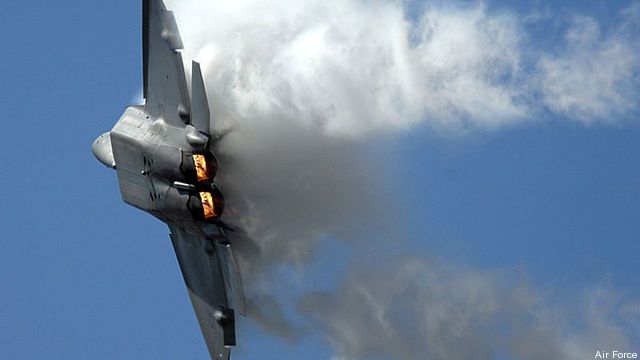F-22 Will Fly Ops If Needed; Bio Research Next ‘Revolutionary’ Science: DepSecDef
Posted on

WASHINGTON: The F-22 will fly in operations if it’s needed while the Air Force keeps a close eye on the oxygen problem, Deputy Defense Secretary Ash Carter said today.
“The answer is, yes. The aircraft will be used operationally if need be,” Carter said in response to a question during a morning appearance at the conservative American Enterprise Institute. Carter made clear the Pentagon is closely watching the apparent problems with the advanced aircraft’s oxygen system. But it will fly should Iran or something else require its services. Defense Secretary Leon Panetta ordered the Air Force to “accelerate” installation of a backup system that automatically supplies oxygen to a pilot if there is a problem with the primary system. An unknown number of F-22s were deployed in late April to the United Arab Emirates, a short flight to Iran.
As is his usual style, Carter worked very hard at to avoid making any news. However, two questions did spark public comments on topics rarely discussed in public by senior defense officials: biological weapons and the enduring sad state of Army acquisition.
Former Deputy Defense Secretary Paul Wolfowitz, now with AEI, asked his successor about biological weapons and the Pentagon’s commitment to countering them.
Carter said “counter WMD is one area that DoD protected during” its budget deliberations. Of perhaps more interest in the long run, he claimed that biological sciences are going to be “the revolutionary sciences” for the next generation, as information technology was for the last generation.
And Carter also made clear the Army, which has had enormous problems with its acquisition system over the last decade, faces continuing challenges.
“My successor, Frank Kendall, I know will be working especially with the Army to improve their tradecraft in acquisition,” Carter said. He sounded fairly sympathetic toward the service. “The Army is making the largest and most difficult transition because they have been in Afghanistan and Iraq for more than 10 years,” he noted, adding that Defense Secretary Leon Panetta and he have striven to make sure the Army’s civilian and military leaders “have the strategic space and time to make these decisions.”
He did, however close his response to my question this way: “There is a lost decade there for the Army. It’s sad.”
Finally, on the unavoidable issue of mandatory defense budget cuts that may be triggered Jan. 3 by the Budget Control Act, Carter defended the Pentagon’s decision not to make alternative budget plans. The sequester, as the cuts are known, “was designed to be irrational” to force Capitol Hill to make decisions. Essentially, his point was that the Defense Department can’t very well plan for an irrational act that may or may not happen.
We’ll see.
Subscribe to our newsletter
Promotions, new products and sales. Directly to your inbox.
